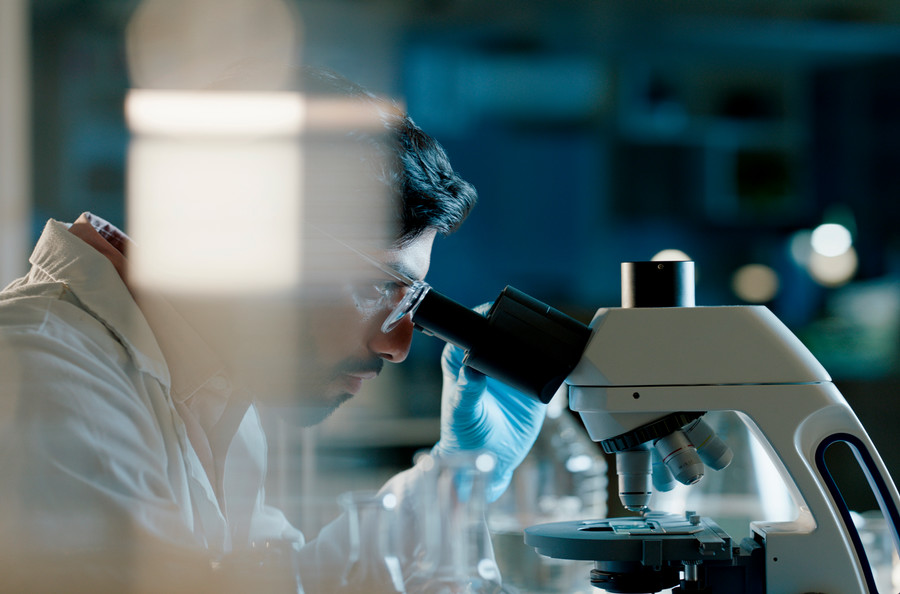Brain Disease That’s Treatable. Preventable.

A new story is within our grasp
For too long, Alzheimer's, Parkinson's, ALS, Huntington's, and other neurodegenerative disorders remained poorly treatable, incurable, and in some cases, seen as inevitable. It doesn't have to be that way.
The Center for Neurodegenerative Disease (CND) is working to crack the code on an array of diseases that attack the nervous system. Our 40 research labs collaborate interdepartmentally—from biochemistry to pharmacology—on a daily quest to understand why these conditions occur and how they respond to various interventions.
As leading investigators of multiple National Institute of Health (NIH)-funded research centers, our team is at the forefront of neurodegenerative disease research. We're committed to training the next generation of scientists, too. With undergraduate, graduate, and post-doctoral students working alongside Emory School of Medicine faculty, we're nurturing what's next – right now.
Visit the Center for Neurodegenerative Disease Website
Changing minds requires game-changing goals.
Advancing global understanding.
Discoveries we make here can help researchers and health care professionals everywhere deliver more effective treatments for neurodegenerative diseases.
Inspiring collaboration.
To accelerate brain health breakthroughs, we need lots of brains on the challenge. If you’re a scientist or brain physician, we want you to take part in our investigations.
Driving new treatments.
The more we highlight our discoveries, the more we encourage development of targeted therapies.
Promoting health care equity
If our work can help bridge health care gaps, we’ll ensure more comprehensive diagnostics and treatments.
Empowering patients and families.
Educating the public about advancements empowers people to make informed decisions.
Encouraging research participation.
By elevating new discoveries, we hope to motivate many communities to join us in clinical trials, making our research more relevant in the world.
Boundary-Breaking Team
The Center for Neurodegenerative Disease (CND) began in 2002 and was founded by Dr. Allan Levey, who now leads the Emory Goizueta Brain Health Institute.
Dr. Todd Eliot Golde, a global leader in neuroscience research, became the Center's Director in 2022, also joining Emory University School of Medicine as a primary professor of Pharmacology and Chemical Biology. Dr. Golde has received more than $65 million in research grants through the National Institutes of Health (NIH) and is an inventor on over 15 patents and patent applications.
The CND's Associate Director is Nick Seyfried, Ph.D., a professor in Emory's Department of Biochemistry and Neurology. Dr. Seyfried's research focuses on identifying and characterizing specific proteins associated with various neurodegenerative diseases.
These leaders are joined by 25 research physicians from Emory's faculty, spanning expertise in more than 10 specialty areas. Their teamwork is pointing to promising new therapies that will modify neurological diseases.
Research Priorities
The most common cause of dementia is Alzheimer's Disease, afflicting nearly half of all adults over age 85. Many other neurodegenerative disorders, like Lewy Body Disease, can also lead to dementia. The molecular basis of these conditions is becoming clearer, and new treatment opportunities are emerging. Our investigators are exploring how genetics, cell biology, new diagnostic methods, and experimental clinical approaches may lead to slower disease progression.
This neurodegenerative disease leads to progressive immobility, tremors, and often neuropsychiatric symptoms. While it's associated with the elderly, about 15% of patients are diagnosed before the age of 50. Our team is world-renowned for Parkinson's research, studying genetic and environmental causes, potential treatment advances, and clinical trials of promising new medications and surgical interventions. We care for thousands of patients diagnosed with Parkinson's and related disorders, funded by multiple public and private grants.
This inherited disorder is caused by a single gene mutation. For every parent with Huntington's (HD) each child has a 50% chance of developing the disease, which causes progressive problems with abnormal movements, coordination, psychiatric issues and dementia. Our HD investigators have pioneered genetic testing protocols, resulting in our recognition as the country's first Huntington Disease Center of Excellence. With our Emory partners, we lead one of the largest HD practices in the world.
These disorders affect strength, movement, and sensation, causing abnormalities of walking and breathing as well as numbness and pain. Our Investigators are working on basic mechanisms associated with these conditions. Already, our discoveries have led to clinical trials in collaboration with the Comprehensive Neuroscience Center, the ALS Clinic, Children's Healthcare of Atlanta (CHOA), the Emory Chemical Biology Discovery Center, and Emory Healthcare.
Strokes occur when a part of the body has a reduced supply of blood and oxygen. This debilitating condition affects about 750,000 Americans each year. Estimates suggest that someone in the U.S. dies every four minutes because of reduced blood flow to the brain—or its complications. Our researchers are an essential component of the Emory Stroke Center, and their work has led to a better understanding of what causes strokes and the development of therapies to minimize their negative consequences.
Revolutionary Research
Arriving at answers requires sequential studies:
- the genetic and environmental factors that contribute to neurodegenerative diseases
- the development of new diagnostic and therapeutic approaches
- the study of animal models to better understand diseases and their response to various experimental interventions
- clinical testing of new treatments in patients